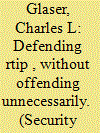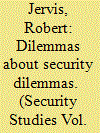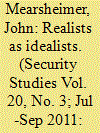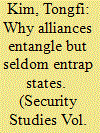| Srl | Item |
| 1 |
ID:
107158


|
|
|
|
|
| Publication |
2011.
|
| Summary/Abstract |
In 2004, an al Qaeda affiliate killed 191 civilians in Madrid. Spain's general election three days later confounded pollsters' expectations; the incumbent Partido Popular was ousted by the challenging Partido Socialista Obrero Español ( psoe ), a party committed to withdrawal from Iraq. This manuscript examines the notion that this was a strategic terrorist success. The first strategic form considered is coercive bargaining. The paper finds that al Qaeda is not a credible coercive agent and debunks the popular myth that Spanish voters entered a coercive bargain with the network. The paper also considers the attacks through the strategic frameworks of terrorist advertising, provocation, regime destabilization, and morale building. It finds that the attacks' only strategic achievement was building morale. Finally, the paper provides a multi-factor explanation of how the Madrid bombings contributed to the psoe victory despite their lack of strategic impact. The upshot of the analysis is that there is little reason to believe such electoral impact is replicable.
|
|
|
|
|
|
|
|
|
|
|
|
|
|
|
|
| 2 |
ID:
107172


|
|
|
| 3 |
ID:
107161


|
|
|
|
|
| Publication |
2011.
|
| Summary/Abstract |
The fact that democracies maintain peaceful relations with each other is regarded as one of the few law-like correlations in international relations, but the causes of this empirical phenomenon remain contested. This paper tries to fill this theoretical gap by attributing the remarkable stability between democracies to inter-democratic institutions. At the same time, it contributes to the debate on the need to differentiate among international organizations in order to assess their peace-building effects. We identify transnational and trans-governmental linkages as crucial features that distinguish inter-democratic from traditional institutions with non-democratic or mixed membership. In order to explain these institutions' peace-building effect, we analyze the impact of international institutions on rivalry mitigation with a view to five pairs of states: France-Germany, Greece-Turkey, Argentina-Brazil, Indonesia-Malaysia, and Japan-South Korea. Those dyads all look back at a history of rivalry, conflict, and mutual threat perceptions, and they are located in highly institutionalized regional settings but vary with regard to their political regime type. The controlled comparison of cases demonstrates that the embeddedness of international institutions in transnational and trans-governmental linkages corresponds to each member's regime type and that these institutional differences are responsible for the varying extent of rivalry mitigation.
|
|
|
|
|
|
|
|
|
|
|
|
|
|
|
|
| 4 |
ID:
107164


|
|
|
| 5 |
ID:
107170


|
|
|
| 6 |
ID:
107171


|
|
|
| 7 |
ID:
107169


|
|
|
| 8 |
ID:
107166


|
|
|
| 9 |
ID:
107168


|
|
|
| 10 |
ID:
107159


|
|
|
|
|
| Publication |
2011.
|
| Summary/Abstract |
This paper explains one of the central roles of alliance contracts, the prevention of undesirable military entanglement. The existing literature on alliances argues that entrapment is a major concern for potential and actual alliance partners, but it is difficult to point out clear cases of entrapment. I provide two answers to this puzzle: First, entrapment is a narrower concept than others have realized, and it is rarer than the literature suggests. Second, leaders anticipate entrapment and carefully design alliance agreements before and after states form alliances. I examine the second argument through case studies of us alliance agreements with South Korea, Japan, and Spain.
|
|
|
|
|
|
|
|
|
|
|
|
|
|
|
|